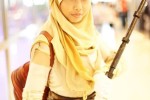In January of this year, philanthropist Leslie Sacks, human rights lawyer Catinca Tabacaru and a team of extraordinary women came together to create Women’s Voices Now, an organization based in New York whose aim is to “empower women and give voice to the struggle for civil, economic, and political rights.”
This group of women has wasted no time in carrying out their mission. Already hosting what is being called the “first-ever international showcase of short films about Islam and women,” Women’s Voices Now has creatively crafted Women’s Voices from the Muslim World: A Short-Film Festival in attempt to create an online platform “where underrepresented women can be heard by an international audience, women can communicate with each other, and the dialogue on women’s rights can be elevated by a multitude of views from diverse national, economic, ethnic and religious backgrounds.”
The festival will showcase the top selection of digital short films submitted in an online competition through the Women’s Voices Now website. The short films feature women from different faiths and backgrounds living in Muslim-majority countries, as well as Muslim women living as minorities in other countries. The competition is open to filmmakers of all genders and backgrounds and will remain open for submissions until November 24th.
Luckily for millions of savvy web goers, there is already a great collection of films that are sure to move you to laughter or tears, with one of my personal favorites already in submission: 1700% Project: Mistaken for Muslim by Anida Yoeu Ali.
Just to give a preview of some of the top-rated submissions so far:
“Is This Honor?” by Dalia Odeh / Jordan: “Shedding light on the definition of “Family Honor” and how this controversial issue affects the lives of people, especially women, within the Jordanian society.”
“Jazbaa (A Strong Will)” by Rama Barhat / India: “Manju Khatri is no ordinary woman. She’s taken on a male dominated society the only way she knows – driving an autorickshaw in Udaipur. The only female rickshaw driver, she has a faithful following of clientèle, especially among children going to school.”
“A Garden In Shigar” by Mahera Omar / Pakistan: “Nusrat, Khezran, Zakia, Asiya and Sajida are five young women from the scenic Shigar Valley in the mountainous northern areas of Pakistan. As interns with the Aga Khan Cultural Service Pakistan (AKCSP), their project is to landscape the Abruzzi secondary school’s garden in the village of Sainkhor, Shigar, Baltistan. Tahereh, their guide and mentor, has come all the way from Los Angeles, California, to teach the women the principles of design and landscaping. In learning these skills to transform a rubble strewn field into a one-of-a-kind teaching garden, these women sow the seeds for their own transformation.”
“My Name is Pat” by Patricia Fermazi / United Arab Emirates: “”My Name is Pat” is a slice from the life of a young Filipina expatriate struggling to discover her identity.”
“A Land Called Paradise” by Lena Khan / USA: “In December 2007, over 2,000 Muslim Americans were asked what they would like to say to the world. This is what they said.”
The film submissions can be reviewed and rated on the Women’s Voices Now website by web users all over the world. They will later be officially voted on by a panel of judges who will be looking for films that are candid and explore women’s rights and achievements, focusing on “the positive contributions and accomplishments of Muslim women.” In addition to being selected for cash prizes, the winning films will be screened at the WVN Festival in Los Angeles on March 10-12, 2011 and in other venues worldwide.
Tabacaru says about the films:
“We’re very used to hearing about the Muslim woman as the victim, the oppressed, the veiled. What we’re seeing through this film festival is that we’re getting stories which we would have never dreamt of getting. They are about women doing things that, before doing this project, I would never have imagined.”
In such a short span of time, Women’s Voices Now is earning the support of many and quickly working to fulfill its goals by providing a space where filmmakers from various religious, cultural and ethnic backgrounds can educate and move an international audience of film viewers, through a influential means of media, towards a collective goal of empowerment and gender equality.
Here’s a sampling. This is one of the many submissions on the Women’s Voices Now website:

